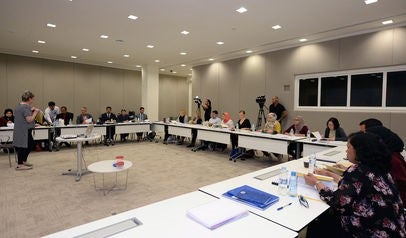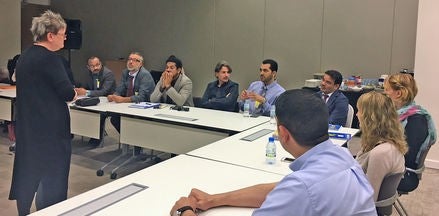In light of its mission towards capacity building within the field of Autism Spectrum Disorder (ASD) service provision, Qatar Biomedical Research Institute (QBRI) – a research institute within Hamad Bin Khalifa University (HBKU) – has recently concluded two specialized training courses that help professionals accurately assess and diagnose autism. The courses, which encompassed the administration of the Autism Diagnostic Observation Schedule – second edition (ADOS-2) and the Autism Diagnostic Interview - Revised (ADI-R), were hosted at the HBKU Research Complex in Education City from April 16 to 23. Eligible professionals from select organizations were invited to attend the eight-day classroom training and licensing session.

The sessions were geared towards clinicians and professionals having experience in working with individuals with ASD - whether clinically or for intervention. Dr. Omar El-Agnaf, acting executive director at QBRI, said: “Our institute is committed to the improvement and transformation of healthcare through innovation in prevention, diagnosis, and treatment of diseases and disorders affecting the Qatari population and the region. We believe this training will serve in enhancing diagnostic services for individuals with the disorder in the nation and look forward to future opportunities yet to be explored.”

ADOS-2 and ADI-R are internationally recognized as golden standard tools in ASD diagnosis. Due to their high specificity and sensitivity, their reliability has been acknowledged by researchers. The professional training was conducted in collaboration with BeginningwithA, an independent consultancy - based in Cambridge, United Kingdom – which offers quality training and services, for professionals and for people affected by autism. Upon successful completion, participants were awarded a certificate of course achievement on clinical reliability. They also have the future opportunity to undertake post-course practical assignments to be assessed for research reliability.
Giving a personal account of the recent courses, Dr. Rachael Archard, a clinical psychologist at Sidra Medicine, said: “The ADOS-2 training has been invaluable when considering the assessment and diagnosis of an Autism Spectrum Disorder. A range of clinicians attended the training including, psychologists, speech therapists and occupational therapists. It was helpful to listen to the different ideas from allied health professionals and their approach to the ADOS-2 assessment. This multi-disciplinary approach allows for a range of helpful intervention options for young people and their families in Qatar. The training exceeded my expectations, particularly with the opportunity to observe and practice the ADOS-2 with an actual family. I am excited about using the ADOS-2 with young people here at Sidra Medicine.”
For many participants, the training modules were of immense value to their occupational success. "I had some knowledge about ADOS before attending this course, but now, and after completing the training module, I feel much more confident about ADOS administration. Different modules were clearly explained through videos and presentations, and that made me more aware of these modules and when to use each one of them, as well as the difference between ADOS-1 and ADOS-2. It was an excellent and very useful training course. It was especially relevant to my field and presented a good balance between practical and knowledge-based training," said Dr. Adolis Abdelmuniem, a development and behavior pediatric doctor at Hamad Medical Corporation's Child Development Center.
The training courses come as part of QBRI’s commitment towards capacity building through the training and development of highly skilled professionals. An ongoing month-long public awareness campaign has been launched by the institute in support of the tenth annual World Autism Awareness Day marked worldwide in April and globally celebrated on the second of the month. So far, the institute has taken part in an array of community events and broad expert discussions and presentations.
QBRI is one of HBKU’s three national research institutes, supporting Qatar’s national health priorities through research activities and scientific breakthroughs that impact both the country and the overall region. As an institute dedicated to improving and transforming the availability of healthcare services that target the Qatari population as well as the world, QBRI leads initiatives that aim to support and recognize individuals with autism, to enhance public understanding.
Located in Education City, HBKU is a member of Qatar Foundation for Education, Science, and Community Development. To find out more about HBKU’s colleges, programs, research institutes, and events visit hbku.edu.qa.
Media Coverage





